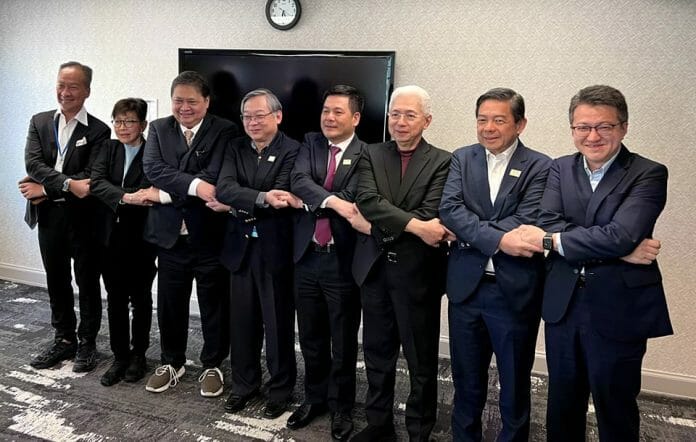Malaysia has called for trade policies to include elements of green transition and building a resilient global health system.
In a statement issued by the Ministry of Investment, Trade & Industry (MITI) today (May 30), Deputy Minister Liew Chin Tong urged Asia-Pacific Economic Cooperation (APEC) members to not enter into economic decoupling to prevent the world from becoming a bifurcated place, pointing out it is vital to ensure that APEC and the World Trade Organisation (WTO) continue to thrive and foster deeper economic collaboration to address challenges facing the world such as financial crisis and inequality.
In the session titled “Fostering Sustainable and Inclusive Trade in the Region”, Liew shared Malaysia’s National Investment Aspiration (NIA) that was launched in 2022 and the new Industrial Masterplan that is being finalised, with the aspiration to increase economic complexity, create high value job opportunities, extend domestic linkages, develop new and existing economic clusters, improve inclusivity and embrace elements of environmental, social and governance (ESG).
Representing Minister of Investment, Trade and Industry Senator Tengku Datuk Seri Utama Zafrul Tengku Abdul Aziz, the Deputy Minister led the Malaysian delegation to three ministerial-level meetings from 25 to 27 May 2023 in Detroit, Michigan, the United States of America.
The Ministerial-level engagements were the 29th APEC Ministers Responsible for Trade (MRT) Meeting, held from 25 to 26 May 2023, the Comprehensive and Progressive Agreement for Trans-Pacific Partnership (CPTPP) Meeting on 26 May 2023 and the Indo-Pacific Economic Framework for Prosperity (IPEF) Ministerial Meeting on 27 May 2023.
Chaired by Her Excellency Ambassador Katherine C. Tai, the United States Trade Representative (USTR), the MRT Meeting witnessed the full participation of APEC Trade Ministers and Representatives from all 21 APEC Economies. APEC Trade Ministers gathered for the first time this year after their last APEC Ministerial Meeting held in Bangkok under Thailand’s Chairmanship.
Under the theme “Creating a Resilient and Sustainable Future for All”, grounded in three main priorities, emphasising being Interconnected, Innovative and Inclusive, APEC 2023 aims to strengthen Member Economies recovery and resilience as well as advance broad-based economic growth to benefit workers, businesses and families.
At the margins of the MRT Meeting, Liew also had several bilateral engagements, namely with Ambassador Sarah Bianchi, Deputy US Trade Representative; Richard Maru, Minister for International Trade and Investment of Papua New Guinea; Rob Stewart, Deputy Minister of International Trade, Canada; Yamada Kenji, State Minister for Foreign Affairs, Japan; Algernon Yau, Secretary for Commerce and Economic Development, Hong Kong, China, with the discussions revolved around ways to strengthen and deepen economic cooperation, including exchange of views on issues of mutual interest such as sustainability, via the ESG agenda and supply chain resiliency.
Meanwhile, during the CPTPP Ministerial Meeting hosted by the Honourable Damien O’Connor, Minister for Trade and Export Growth of New Zealand on 26 May 2023, Liew reiterated Malaysia’s continued support to maintain and uphold the high-standards of the CPTPP Agreement. He also highlighted the importance of information sharing among CPTPP Parties on the utilisation and benefits offered under the Agreement, particularly SMEs’ integration into the CPTPP supply chain to drive economic growth.
While in Detroit, Liew also participated in the Second IPEF Ministerial Meeting, co-chaired by Her Excellency Ambassador Katherine C. Tai, USTR and Her Excellency Gina Raimondo, Secretary of Commerce on 27 May 2023. The Ministerial session marked two major milestones with the announcement on substantial conclusion of the IPEF Supply Chain Agreement and substantial progress made in the Technical Assistance and Economic Cooperation Chapter under the IPEF Trade Pillar.
During the meeting, Liew called for all IPEF partners to work towards building vertical integration of supply chains to achieve holistic and progressive growth for all.
In essence, the proposed Supply Chain Agreement seeks to enhance the collective understanding of supply chain risks and how to manage them in order to increase the resiliency, efficiency, productivity, sustainability, transparency and inclusivity of supply chains. This entails among others, identification of critical sectors and key goods by each Partner country, as well as the establishment of the relevant supply chain bodies at the IPEF regional level to facilitate cooperation among the Partners.
Ministers also undertook a stocktake of the negotiations progress in three other IPEF pillars namely, Trade, Clean Economy and Fair Economy,focussing on steps to achieve strong tangible outcomes and benefits for all Partners.
Specifically, on the Trade Pillar, Ministers reaffirmed their commitment to advance negotiations towards achieving high ambition that built upon the rules-based multilateral trading system. The 14 Partners also pledged their collective commitment to continuing work to jointly creating an environment conducive in expanding access to opportunities for workers, companies, and peoples in their markets.
The 14 IPEF Partners represent 40 percent of global GDP and 28 percent of global goods and services trade.









